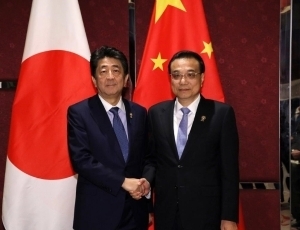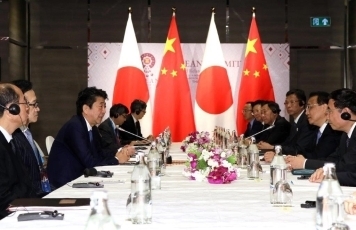Japan-China Relations
Japan-China Summit Meeting(Premier Li Keqiang of the State Council of the People’s Republic of China)
November 4, 2019
 Photo: Cabinet Public Relations Office
Photo: Cabinet Public Relations Office
 Photo: Cabinet Public Relations Office
Photo: Cabinet Public Relations Office
On November 4, commencing at around 10:28 a.m. local time (around 12:28 p.m. JST) for approximately 25 minutes (simultaneous interpretation), Mr. ABE Shinzo, Prime Minister of Japan, who is visiting Bangkok, the Kingdom of Thailand to attend ASEAN-related summit meetings, held a Japan-China Summit meeting with H.E. Li Keqiang, Premier of the State Council of the People’s Republic of China. The overview of the meeting is as follows.
1 Beginning
(1) The summary of Premier Li Keqiang’s opening remarks is as follows.
- I am pleased we can meet again since a year ago. Over the past year, the two of us have visited each other’s country and have helped the Japan-China relationship to get back onto a normal track and make new advances.
- Japan and China are neighboring countries and major economic entities in the world. Both Japan and China intend to protect multilateralism and free trade. Japan-China relations should be expanded by focusing on their shared interests.
- This year is the 20th anniversary of Japan-China-ROK trilateral cooperation. The eighth Japan-China-ROK Trilateral Summit meeting is expected to be held in China next month, and the location will be Chengdu, a very vibrant city in western China. I hope to attend the Trilateral Summit meeting with Prime Minister Abe in Chengdu. I am confident that the Japan-China-ROK trilateral cooperation will promote the development of a more organized and competitive supply chain in East Asia, and that this will make contributions bilaterally, trilaterally, and globally.
(2) The summary of Prime Minister Abe’s response is as follows.
- I am pleased we can meet again following our previous meeting in October of last year. Since May of last year when you visited Japan and we visited Hokkaido together, reciprocal visits between the leaders have steadily taken place, including my visit to China last October and President Xi Jinping’s attendance at the G20 Summit in Osaka this June. In this regard, definite progress has been achieved in Japan-China cooperation.
- On October 22, Vice President Wang Qishan, as a special envoy for President Xi, attended the Ceremony of the Enthronement of His Majesty the Emperor. This was a very important ceremony for Japan, and I appreciate the Vice President’s attendance.
- Next is my turn to visit China for the Japan-China-ROK Trilateral Summit meeting which China is arranging as a Chair. You just mentioned that the Summit meeting will be held in Chengdu. Japan intends to seize this opportunity and cooperate with China, in order to make President Xi’s State Visit to Japan next spring a meaningful one which is suitable for “a new era of Japan-China relations.”
- Both Japan and China are countries with a significant responsibility for promoting peace, stability, and prosperity in the region and the world. I expect further developmentof the Japan-China cooperation.
2 Japan-China relations and other matters
(1) The two sides confirmed that they will coordinate, including on the occasion of the Japan-China-ROK Trilateral Summit meeting, in order to ensure a meaningful State Visit to Japan by President Xi Jinping next spring. Prime Minister Abe then expressed his hope that Japan and China, as countries with a significant responsibility for the peace and prosperity of Asia and the world, will address the issues facing the region and the international community.
(2) Prime Minister Abe once again strongly requested China’s positive responses to: (1) the issue of China’s import restrictions on Japanese food products; (2) maritime and security issues, including the East China Sea such as waters surrounding the Senkaku Islands; and (3) detainment of Japanese nationals in China.
(3) Prime Minister Abe, expressed deep concerns over the situation in Hong Kong, urged for a resolution through the exercise of self-restraint and peaceful dialogue by the parties concerned, and noted the importance of the continued prosperity of a free and open Hong Kong under “one country, two systems.”
(4) Regarding the South China Sea issue, which is a common concern of the international community, Prime Minister Abe noted the importance of demilitarization of disputed features.
(5) The two sides shared the view on further strengthening cooperation in a variety of areas, including Japan-China economic and practical cooperation. Furthermore, the two sides confirmed that they will continue to cooperate toward the early conclusion of the Regional Comprehensive Economic Partnership (RCEP). Prime Minister Abe added that Japan will promote the implementation of international standards outlined in the “G20 Principles for Quality Infrastructure Investment,” and looked forward to China fulfilling a larger role and responsibility for advancing the reform of the World Trade Organization (WTO).
(6) The two sides discussed recent North Korean affairs and shared the view on the importance of fully implementing United Nations Security Council resolutions. In addition, Prime Minister Abe asked Premier Li for his understanding and support for the early resolution of the abductions issue.
(7) The two sides shared the view that they will continue to have these exchanges of views from a broad perspective, expecting President Xi’s State Visit to Japan next spring.

